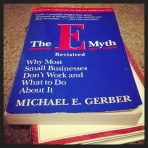Twitter Summary: Being able to consistently deliver is more important than your product because your product is not your product, how you do business is.
Principle of “Your Product is Not Your Product”
I’m about half way through reading The E-Myth by Michael E. Gerber. The only reason I started reading this book is because I mentioned some of my new ideas to a relative and he suggested I stop reading everything else and read this one now. It’s presented me with a number of interesting paradigm shifts and they’ve caused me to reconsider how I’m approaching and preparing for the future.
I’ve never considered myself interested in “business” or entrepreneurship, but my mind has been wandering in those paths lately. Most of what little I do know about business is challenged by this book and a lot of the trials I’ve experienced in my own career are being confirmed. Kind of eerie. What’s even more dumbfounding is this book was written in 1995. A lot of people still don’t seem to have gotten the memo.
Without going into too much detail, here are some key quotes from the book that summarize the what I’m taking away as the key point of the book so far:
Your product is not your product, how you do business is. The consistency with which you deliver your goods is of more value than your commodity. Standardizing the process used to create and deliver services frees you from your job and is often disregarded, but it increases your value and separates you from others in your field.
“The purpose of going into business is to get free of a job so you can create jobs for other people.”
Widget-ize your process so you build “a business that works not because of you but without you.”
“…it’s not the commodity or the work itself that is important. What’s important is the business: how it looks, how it acts, how it does what it is intended to do.”
Making Connections to Your Product is Not Your Product
 I fully agree with the majority of this idea. A standardized process is necessary to the efficiency of any organization – for countless reasons that aren’t worth going into right now.
I fully agree with the majority of this idea. A standardized process is necessary to the efficiency of any organization – for countless reasons that aren’t worth going into right now.
Everyone uses McDonald’s as the great example of efficiency of process. McDonald’s created a business that is almost bulletproof. You can hire people with no work experience, like kids from high school or people with down syndrome, and McDonald’s can still deliver you a Happy Meal no matter what state you’re in and it will be exactly the same. You can count on it, trust it to be what you remember it to be, and know that you’re going to get the same product every time.
For some reason, even though most people know McDonald’s is not good for you, the consistency of the product outweighs the quality of the product! So, I see that a not-so great product (no matter what field you’re in) can be successful if the consistency of the business to deliver is high. Because, what good is a great product if it can’t be delivered consistently?
I don’t believe this principle only applies to business. Do you have a standardized process for working out, doing dinner/lunch/breakfast, reading, working, or anything that you have to do on a regular basis? Without a habitual process, which we seem to develop whether we like it or not to some degree, we are unable to accomplish important tasks let alone great tasks. I believe this principle has deeper application than McDonald’s effective burger assembly lines.
Call to Action
We should improve efficiency in our lives, whether it be at work or home, by focusing on creating a baseline standardized process. Disciplining yourself to create habits of effective behavior are key to making the most of time and energy. I should listen to my own advice.







hey thanks for sharing I really love your thought process on using this as an example for other areas in our life as well as business!
Right on! I’ve a few specific routines that have helped me especially make the most out of time limited situations.